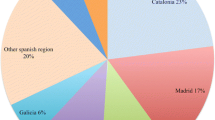Abstract
With the coalescing of the European countries, among many others, official initiatives have been launched to propose minimum requirements for Otolaryngology, Head and Neck surgery (ORL) specialty training by creating an European log book. This study was initiated to assess and compare the acquisition of basic medical key diagnostic and surgical skills by residents and recent ORL specialists in France (FRA) and Germany (GER) and to determine whether gender-specific differences exist. For this, an anonymous questionnaire with questions to basic medical, diagnostic and surgical procedures specific to ORL was developed. 120 FRA and 125 GER questionnaires were returned from participants with a median training experience of 4 years. The female to male ratio was 1.3:1 and 78 % of respondents were residents and 22 % recent specialists. Concerning diagnostic procedures, there was no significant overall difference. Germans performed better in basic medical skills, while study participants from FRA had performed surgical procedures significantly more often in a more independent manner than German respondents in the areas of otology, rhinology and head and neck. Only in septoplasty, as part of rhinology, the Germans had a light advantage compared to the French. No difference was found for trauma surgery. No gender-specific difference became apparent. Taken together, in FRA, ORL training is far more surgically orientated than in GER. It remains unclear at what time, the Germans may catch up with their skills. Initiatives should be taken in GER to secure an adequate acquisition of surgical skill and experience to maintain a high level of ORL-specific competence.
Similar content being viewed by others
References
Ärztekammer B (2004) Logbuch Dokumentation der Weiterbildung gemäß Weiterbildungsordnung 2004 der Ärztekammer Berlin über die Facharztweiterbildung Hals-Nasen-Ohrenheilkunde. http://aerztekammer-berlin.de/10arzt/15_Aerztliche_Weiterbildung/15_WB-Logbuecher/20_Logbuecher/Logbuch_FA_Hals-Nasen-Ohrenheilkunde.pdf
Biedma-Velazquez L, Serrano-Del-Rosal R, Garcia-De-Diego JM et al (2012) Dissatisfaction with residency: a discrepancy between preferences and expectations? Med Teach 34:e772–e778
Burgos CM, Josephson A (2014) Gender differences in the learning and teaching of surgery: a literature review. Int J Med Edu 5:110–124
Coates KW, Kuehl TJ, Bachofen CG et al (2001) Analysis of surgical complications and patient outcomes in a residency training program. Am J Obst Gynecol 184:1380–1383 (discussion 1383–1385)
Cochran A, Hauschild T, Elder WB et al (2013) Perceived gender-based barriers to careers in academic surgery. Am J Surg 206:263–268
De Santibanes M, Alvarez FA, Sieling E et al (2015) Postoperative complications at a university hospital: is there a difference between patients operated by supervised residents vs trained surgeons? Langenbeck’s archives of surgery/Deutsche Gesellschaft fur Chirurgie 400:77–82
Farnworth LR, Lemay DE, Wooldridge T et al (2001) A comparison of operative times in arthroscopic ACL reconstruction between orthopaedic faculty and residents: the financial impact of orthopaedic surgical training in the operating room. Iowa Orthopaedic journal 21:31–35
Confederation of european otorhinolaryngology - head and neck surgery. http://www.ceorlhns.org/education/uems-orl-log-book.html. Accessed January 2015
Lavernia CJ, Sierra RJ, Hernandez RA (2000) The cost of teaching total knee arthroplasty surgery to orthopaedic surgery residents. Clinical Orthop Related Res 380:99–107
Mckinley SK, Petrusa ER, Fiedeldey-Van Dijk C et al (2014) Are there gender differences in the emotional intelligence of resident physicians? J Surg Edu 71:e33–e40
Oker N, Escabasse V, Pensky H et al. (2014) Training satisfaction and work environment in Otorhinolaryngology, Head and Neck surgery: a comparison between France and Germany. Eur Arch Otorhinolaryngol
Riska E (2011) Gender and medical careers. Maturitas 68:264–267
Yarger JB, James TA, Ashikaga T et al (2013) Characteristics in response rates for surveys administered to surgery residents. Surgery 154:38–45
Conflict of interest
The authors have no conflict of interest to declare.
Author information
Authors and Affiliations
Corresponding author
Electronic supplementary material
Below is the link to the electronic supplementary material.
Rights and permissions
About this article
Cite this article
Oker, N., Escabasse, V., Al-Otaibi, N. et al. Acquisition of diagnostic and surgical skills in otorhinolaryngology: a comparison of France and Germany. Eur Arch Otorhinolaryngol 272, 3565–3573 (2015). https://doi.org/10.1007/s00405-015-3632-7
Received:
Accepted:
Published:
Issue Date:
DOI: https://doi.org/10.1007/s00405-015-3632-7




